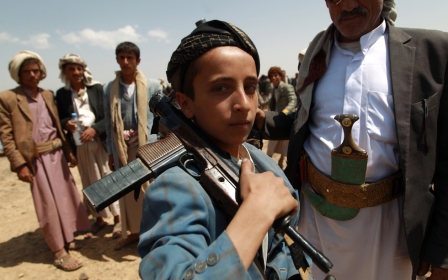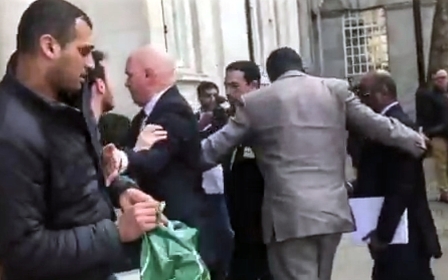Houthis sentence Yemen journalist to death for spying

A Yemeni court in the rebel-held capital has sentenced a veteran journalist to death on charges of spying for neighbouring Saudi Arabia, the press union and rebel media said Thursday.
Since March 2015, oil-rich Saudi Arabia has been leading a deadly military intervention against the Houthis and their allies in the kingdom's impoverished neighbour.
Yahya al-Jubaihi, 61, was convicted of establishing "contact with a foreign state" and providing Saudi diplomats in Sanaa with "reports that posed harm to Yemen militarily, politically and economically," the Houthi-controlled Saba news agency reported.
Prosecutors alleged that Jubaihi, originally from Taiz, had been receiving a monthly salary of 4,500 Saudi riyals ($1,200) from Riyadh since 2010, four years before the rebels overran the capital, Saba added.
The Yemeni press union condemned the "arbitrary" sentence, accusing the rebels of "targeting the freedom of the press".
It said Jubaihi was a "veteran journalist with a long record of professional work across Yemen".
He was seized from his home on 6 September, it added.
The Houthi rebels and their allies - renegade troops loyal to former president Ali Abdullah Saleh - have controlled all government institutions in Sanaa since they overran the capital in September 2014.
Rival bodies loyal to internationally recognised president Abd Rabbuh Mansour Hadi operate out of second city Aden or from exile in Saudi Arabia.
The Aden-based information ministry said Jubaihi's trial was a "farce" and accused the rebels of looking to "settle political accounts... through a politicised judiciary."
Jubaihi wrote regular columns in Saudi newspapers Okaz and al-Madina, as well as in Yemeni newspapers.
He served at the government's press department in the 1990s and 2000s when Saleh was president and Hadi was his deputy.
Press watchdogs and human rights groups have been deeply critical of the rebels' treatment of journalists as the conflict in the Arabian peninsula country has escalated over the past two years.
In December, journalist Mohammed al-Absi, 35, died suddenly after publishing reports about alleged corruption. His family and human rights groups said a post-mortem found he had been poisoned.
Eight reporters were killed in Yemen last year, according to the International Federation of Journalists.
That made the country the fourth deadliest for journalists after Iraq, Afghanistan and Mexico, the watchdog added.
Stay informed with MEE's newsletters
Sign up to get the latest alerts, insights and analysis, starting with Turkey Unpacked
Middle East Eye delivers independent and unrivalled coverage and analysis of the Middle East, North Africa and beyond. To learn more about republishing this content and the associated fees, please fill out this form. More about MEE can be found here.




